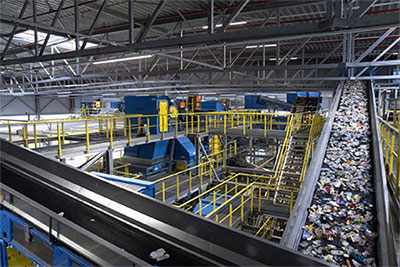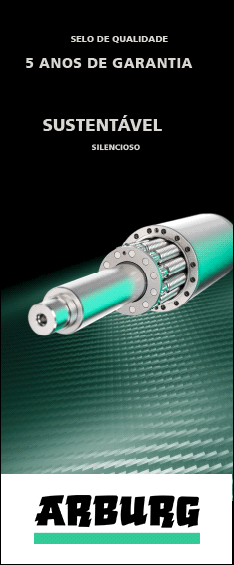| Plastics News |
Stadler focusing on the sorting challenge related to dry recyclables and light packaging
The varying and constantly changing composition of waste materials poses a challenge for designers of sorting plants, which need to deliver consistently high purity rates while managing an increasing degree of complexity. Stadler, a leading supplier of sorting plants for the recycling industry, has been developing high-performance facilities which customize plant concepts to meet the specific requirements of every individual customer in terms of the types of materials that are processed. August, 16, 2021 – The recycling and waste disposal sector is in constant evolution, with an increasing degree of complexity and growing volumes. New regulations, policies and targets have been introduced across the world to address the global waste issue. Different countries have adopted varying approaches to collecting and separating dry mixed recyclables and light packaging as they strive to reduce the quantity of materials going to landfill. The composition and density of this waste is also constantly changing, with an increasing proportion of films and plastic trays. At the same time, the recycling industry is demanding high purity levels of the sorted fractions so that their recycled end-products can compete with virgin materials on the market. These factors are driving a demand for sorting plants capable of processing multiple materials flexibly while delivering consistently high purity rates. Developing sorting plants for dry mixed recyclables and light packaging that meet these requirements calls for a flexible, tailored approach combined with in-depth knowledge of how the varying composition of waste material affects the sorting process. Stadler has been involved in the design of the first plants of this type from the outset and developed numerous such facilities across the world. Design considerations: waste material composition The composition of waste materials arriving at sorting plants can vary depending on different factors, starting from the way waste is collected and separated, which can vary from country to country or even at regional level. Dry mixed recyclables can include paper and cardboard, plastic packaging, ferrous and non-ferrous metals and films – in some cases also beverage cartons or glass. Glass and paper can be collected separately. Drop-off systems tend to lead to cleaner waste than collection. The way local authorities charge for Municipal Solid Waste collection can have an effect on how much people sort their waste for recycling. Different demographics in rural and urban areas will result in strong variations in the composition, and there will even be seasonal fluctuations. “When developing a sorting plant for dry mixed recyclables and light packaging, waste composition is a key consideration,” says Jürgen Berger, Director for International Sales at Stadler. “For example, the mixed film and paper content in the Dry Mixed Recycling material collection in the UK requires more complex processing. If glass is included, it needs to be removed in the early stages to protect the process.” Managing increasing complexity The introduction of new European recycling targets is driving changes in the way waste is collected. In Belgium, the decision was taken to extend the types of plastics collected in the blue bag for packaging waste to include all plastic packaging. As a result, the sorting plant in Willebroek operated by waste management solutions provider Indaver would have to process much bigger volumes and manage the greater complexity involved in sorting more materials. The company decided to invest in a new facility three times bigger than the previous one. They chose Stadler for the design of a plant with the necessary capacity and capable of managing the complexity: “Going into the project with Stadler made us all feel very confident that in the end we would get a high-quality installation with cutting-edge technologies. We knew from the beginning that the project would be in good hands and that Stadler would do whatever was necessary to start up in time,” says Eline Meyvis, Project Engineer of the sorting plant at Indaver. Stadler developed and built a new plant capable of sorting the high volume of packaging waste into 14 fractions at a throughput of over 20 tph using a bag ripper, drum screens, magnets, windsifters, eddy current separators, ballistic separators and optical sorters. Eline Meyvis added: “The flexibility of the whole project team, including the people on site was incredible. Also the will to solve problems and to make the installation function was extraordinary. Stadler delivered a high-quality installation which Indaver can rely on”.. Stadler also managed the complexities of delivering a project during a global pandemic. According to Eline Meyvis, “it was not an easy year with the Corona-pandemic, but Stadler made it happen nonetheless. All the milestones for production and delivery of parts and machines were reached. Construction was finished as planned and commissioning was started on time. Many subcontractors were involved, under the strict coordination of Stadler. With Corona, extra administration was necessary and tests to be done. Although this was not an easy task, any possible delays and problems were countered by great teamwork and a lot of flexibility on both sides”. A flexible approach tailored to the customer Stadler says it has a highly flexible approach to each project, developing a solution tailored to the individual requirements of the customer. The plant processes a very heterogeneous material input, which goes through a pre-sorting that uses a Stadler ballistic separator PPK2000 at the end of the line. It continues with a bag opener, two Stadler ballistic separators STT5000, 2 magnets, 9 optical sorters, an eddy-current separator and a suction system. “This project has been in the planning stages for almost eight years and thanks to working together with Stadler it became possible,” says Silvio Urias Pereira. “It was a 4 hands job, joining Flacipel’s knowledge of the material and of the demand for quality of the final product with the good performance and technology of Stadler's equipment. With this plant, it is possible to meet the high demands of our market, meeting the expectations of our customers with a differentiated and quality product.” Flexibility built into the design and delivery process “The key challenges to address when designing and building a plant for dry mixed recyclables and light packaging are the changes in material composition, in the packaging and in purity requirements, because they can affect the quality and recovery of the products” explains Jürgen Berger. “These changes can happen between the design phase and final plant commissioning, and this possibility needs to be factored in. At Stadler we have the experience to address these issues by integrating flexibility and spare capacity in our design”, adds Berger. This approach was particularly important when Stadler designed a future-proofed, flexible sorting plant for the Schroll Group in France, for whom the company had previously designed and built 5 plants. On the customer’s request, the facility was designed to allow for future expansion and the sorting of further fractions, as well as the possibility of installing robots. Stadler addressed this demand by including two independent sorting lines – one for the treatment of multi-material and one for hollow material – a set-up that gives more flexibility. Vincent Schroll, co-owner of the Schroll Group, says: “the technical evolution of the equipment meets the growing requirements of our sorting centers.” Pascal Schroll co-owner, adds: “We appreciate Stadler's ability to meet commitments, advise us and respond to changes during equipment setup.” Meeting the growing demand for recycling The push to address the global waste issue by working towards a circular economy is driving a growth in the recycling sector. As a result, Stadler has seen an increase in the demand for new sorting plants as well as upgrades and expansions of existing facilities. This was the case of Viridor, one of the UK's leading recycling, resource and waste management companies, which undertook a £15.4m upgrade of its Masons Materials Recycling Facility (MRF) in 2020. As one of two developers of this plant, Stadler says it transformed its operation, increasing its capacity from 65,000tpa to 75,000tpa and significantly improving output quality, achieving 98.5% purity on newspapers and pamphlets and 95% for polymers such as PET, HDPE and mixed plastics. Founded in 1791, Stadler is dedicated to the planning, production and assembly of sorting systems and components for the waste disposal and recycling industry world-wide. Its team of over 450 employees offers a tailor-made full service, from conceptual design to planning, production, modernisation, optimisation, assembly, start-up, conversions, disassembly, maintenance and servicing of components to complete recycling and sorting systems. Its product range includes ballistic separators, transport conveyor belts, screening drums and label removers. Source : Stadler |


